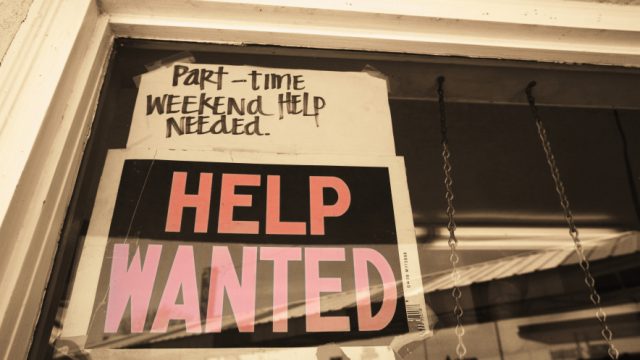Why Aren't Teenagers Working? It's The Minimum Wage, Stupid

“It’s Summer, but Where Are the Teenage Workers?” asks the New York Times in a headline:
Ice cream still needs scooping, beaches still need guarding and campers still need counseling. But now, there are way fewer teenagers doing it all this summer.
Since 2000, the share of 16- to 19-year-olds who are working has plummeted by 40 percent, with fewer than a third of American teenagers in a job last summer. Their share of the overall work force has never been this low, and about 1.1 million of them would like a job but can’t find one, according to the Bureau of Labor Statistics.
Experts are struggling to figure out exactly why. “We don’t know to what extent they’re not working because they can’t find a job, or aren’t interested, or are doing other stuff — like going to summer school, traveling, volunteering, doing service learning,” said Martha Ross, a fellow at the Brookings Institution, a research organization based in Washington.
As is the case with most economic questions the answer to why teenagers aren’t working is likely complex. I think we could list factors contributing to this problem which range from helicopter parenting to the “Great Recession” of 2008 and 2009 as explanations and be accurate to one degree or another. Yet, nowhere in the Times story does minimum wage policy get a mention.
How can that be? Are we supposed to believe that a 40 percent increase in the minimum wage from 2007 to 2009 had no impact on employment of young, low-skill workers?
I think the proponents of the minimum wage – which includes the folks at the Times – would very much like us to believe that, yet it is a little hard to believe.
[mks_pullquote align=”right” width=”300″ size=”24″ bg_color=”#000000″ txt_color=”#ffffff”]…it’s getting harder for kids to learn those lessons because there just aren’t the same number of entry-level jobs available for kids as there were when I was a kid. And part of that problem is the minimum wage.[/mks_pullquote]
The jobs the Times describes – ice cream scoopers, lifeguards, and camp counselors – are entry-level jobs of the sort one would expect to command only the minimum wage or near to it. So if you increase by roughly 40 percent the cost of the labor which typically filled those jobs, is it any surprise that employers have reacted?
What’s really troubling is that by making it harder to employ teenagers and other entry-level workers we aren’t helping them. Sure, they will make a bigger hourly wage per hour, but only if they can find a job. And if they don’t find a job, they aren’t getting the work experience that can help them move up the ladder.
That means we’re doing a major disservice to an entire generation of America’s youth.
Speaking from my own experience, I went to work early in life and learned a lot of important lessons. Starting in the fifth grade through my junior year in high school I delivered copies of the Minot Daily News. My last two years of high school I worked in an auto detail shop, vacuuming out cars and running a hot water pressure washer in a brutally oppressive summer temperatures. I also worked in a computer tech support call center, which was tedious and boring but had the benefit of air conditioning.
There was nothing glamorous about these jobs. I made the minimum wage washing cars – $5.15 per hour at the time – and less than the minimum delivering papers. I made more doing technical support because I aced an aptitude test when I applied. I think I was pulling down $9.00 per hour, which was heady stuff for a 17 year old punk in the late 1990’s.
But more important than what I made was what I learned.
I learned what it meant to have responsibility. I found out what happened when I didn’t show up for work on time or didn’t get my work done, things I was guilty of at times. I learned how to maintain a working relationship with people I didn’t particularly like.
These are lessons I value to this day, and they are lessons I hope my children will learn before they become adults. But it’s getting harder for kids to learn those lessons because there just aren’t the same number of entry-level jobs available for kids as there were when I was a kid.
And part of that problem is the minimum wage.




